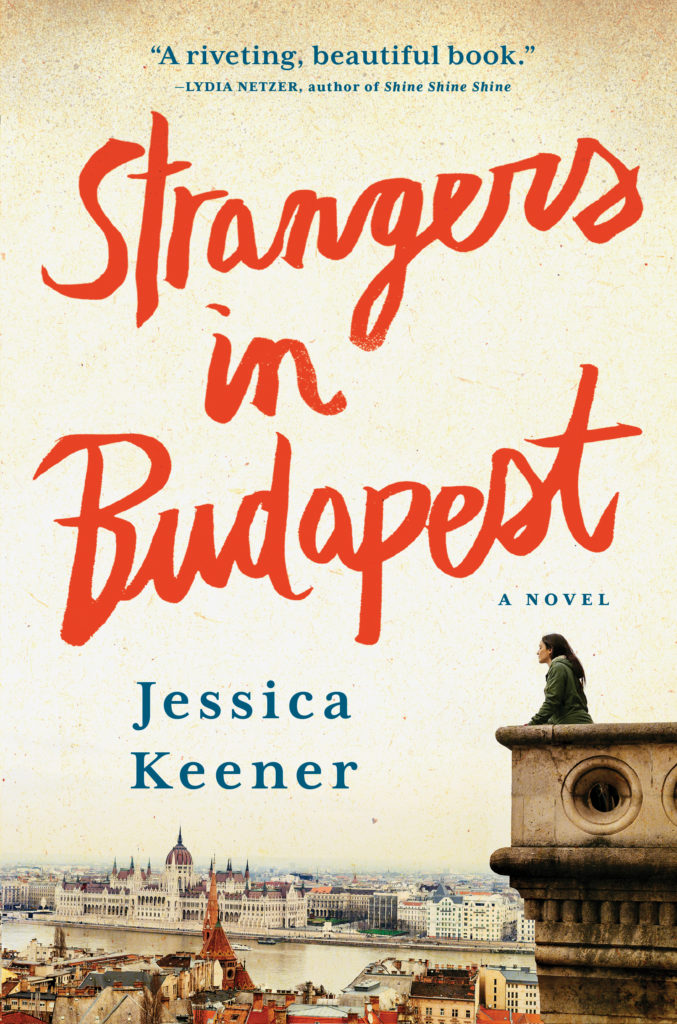Welcome to our #FridayReads feature on the blog, where we’ll be excerpting a chapter of one of our favorite books to start your weekend. This week, it’s Jessica Keener’s Strangers in Budapest, a novel that Caroline Leavitt calls a “dazzlingly original tale about home, loss, and the persistence of love.”
Scroll down for an excerpt.

Strangers in Budapest
She’d grown used to calling the Danube by its Hungarian name—Duna. In fact, she preferred it over the American version. The whimsical sound—Duna—felt light on her tongue, fanciful and upbeat, a spirit rising. But, like all things in this city, the river that glittered at night concealed a darker surface under the day’s harsh sun. The water looked sluggish and dull from this high point on the bridge.
“How much farther?” Annie asked. They had walked a mile, but it felt longer to her.
“Almost there,” Will said, waving his well-worn map. “A few more blocks.”
“Good, because this whole thing feels crazy.”
She pushed their son, Leo, in the baby jogger across a crowded Árpád Bridge—one of eight bridges spanning the river that divided the city into two distinct parts, Buda and Pest. In her running shoes, T-shirt, and shorts, Annie nudged the jogger between couples and families seeking relief from the excessive heat, many of them heading to Margaret Island and the kiddie sprinklers, woods, and shade the park offered. Today they would bypass the park and its entrance from the bridge. She tried to hurry on, but throngs of people strolling in front of her forced her to slow down.
“Think of it this way,” Will said. “We finally get to see their apartment.”
She laughed. “I know. I’m glad about that. That’s good, I guess.”
She did not feel good about it, though. The day had begun with an unsettling fax, an urgent request from their neighbors back home in the States. The strident beeping from the machine in the living room woke her early, before dawn, while Will lay immobile beside her in bed, undisturbed. She sat up, trying to locate the unpleasant sound.
On the bridge, she turned her attention back to the riverbank below and the ferry boats boarding day-trippers for a journey to Vienna four hours away.
“We should take that ferry to Vienna sometime,” she said.
“I agree. We’ll do it,” Will said.
She pushed harder, the humid air dragging on her T-shirt like a heavy coat.
“Up and over,” she said to little Leo, tilting the baby jogger back and hiking it over a curb. Leo loved the sudden movement and let out a joyful screech.
She and Will both laughed at the happy sound. How little their son required—sleep, food, a ride in a stroller—to make him feel loved. She wished she could say the same for herself. After eight months of living here, things were not turning out as they expected.
At last, they reached the opposite end of the bridge and stepped onto the Pest side of town—pronounced Pesht—otherwise known as the flat industrial section of Budapest, where streets, arranged in gridlike patterns, fanned out for hundreds of blocks. Buda was the hilly side.
“Look both ways,” she said as they crossed a wide avenue ringed with trolley tracks.
“There’s the street,” Will said. “Károly utca. Number 647 should be on the left.” He closed his map.
They entered a serene residential street, empty except for parked cars and deeply shaded by maples and oaks, grand as any she’d seen back home in Massachusetts, limbs reaching high into the moist atmosphere. The trees offered a soft feeling of relief from the sharp-edged, intractable sun reflecting off the main boulevards. Leo bent his head back to take in the quilt of greenery overhead. His auburn curls matched Will’s exactly, a coincidence that seemed more miracle than a stroke of fate. How else could she explain it, given that their son had come to them via an adoption agency in North Carolina?
“Ap, Dada.” Leo pointed to Will’s map.
“Map, that’s right,” Annie said. “Daddy needs to hold on to it.”
***
The three-story brick building lacked classical architectural adornments. She guessed it to be late 1930s modernism. Old newspapers littered the entranceway, where a panel of buzzers listed residents’ names. Annie stepped closer to the panel, scuffing a roll of newspapers out of the way, and rubbed her finger across the handwritten letters.
“Just as Rose said. Here it is, number 2F. Rose and Josef Szabo.” From her hip pocket, she unfolded the piece of thin fax paper.
Dear Annie and Will,
We are concerned about the heat you are having. Please go to our flat, no. 2F at 647 Károly utca. A man named Edward Weiss is living there. Edward is in his seventies and not in good health. He has diabetes and a heart condition. We are worried about him.
It was true. Temperatures had turned lethal these past weeks. The summer of 1995 was breaking records for the longest stretch of days over ninety degrees, according to Radio Free Europe, the station she listened to every morning since coming here eight months ago. Already a dozen elderly had died. More deaths expected, no end in sight, the announcer had warned in that Euro-British broadcaster’s accent she’d grown accustomed to.
“Ready?” Will said. He stood next to her, a good half foot taller than she, blocking a ray of sun poking through the trees. He wore his usual summer attire: madras shorts, collared shirt, tennis sneakers.
“Wait. Her instructions are very specific,” Annie said. She reread them aloud: “‘This is important. You must not tell anyone that he is living there. We are trusting you. The buzzer to the apartment is broken, but the front door to the building will be open. It is never locked. Go to the second floor. Knock loudly. Tell him we sent you. He will not like this. Call right away if you find a problem. Hugs and kisses to Leo.’”
Rose’s handwritten consonants curled in the same Hungarian style of script Annie had seen on store receipts here.
“It’s odd Rose never mentioned this Edward Weiss,” she said. She hoisted Leo from the jogger to her hip.
“I know. Let’s go.” Will easily lifted the aluminum baby jogger and carried it through the doorway.
She loved entering buildings for the first time. She attributed this pleasure in part to her father who owned a real-estate company in Portland, Maine, where she grew up. He taught her that buildings were meant to be inspected, surveyed, and assessed. But for Annie, it was more than that. Unknown buildings held secrets, possibilities, surprises—a peek into other people’s hidden lives.
A center staircase greeted them.
“There’s an elevator.” Will pointed to a dark corner behind the stairs.
“Let’s walk up.”
The open stairway turned three times around a shaft shimmering with dust and sun from a skylight above. Leo grasped strands of her short hair. He tightened his plump legs around her waist, the sweat on his soft skin indistinguishable from hers. On the second-floor landing, they found the apartment midway down a dark hall, the last name, szabo, on a tag beneath a peephole.
She knocked, then looked into the peephole, but it was covered up and she could only see black. Leo reached out to touch it.
They waited.
She knocked again. Louder.
“Mr. Weiss?”
She pressed her ear against the door. “I hear something.”
The peephole lightened and after some jostling the door was unlocked. An elderly man with a large forehead stood in the doorway. He eyed the jogger without the usual surprise that Hungarians exhibited.
“Yes? What is it?”
He spoke perfect American English and wore a pajama set: thin navy-colored pants and matching short-sleeve shirt hanging loosely, as if he’d lost a lot of weight. The dark material accentuated his pale liver-spotted skin. Annie took a step back, struck by his bedraggled appearance. The old man’s eyes followed her, two dark lights quivering with nervous energy. She wondered if he were feverish.
Will said, “I’m Will Gordon. Our old neighbors in the US, Rose and Josef Szabo, asked us to come by. This is my wife, Annie. We used to live across the street from Rose and Josef.”
“In Massachusetts,” Annie said.
“Yes. Yes. I know about you. What are you doing here?”
Annie looked at Will, then said, “Rose was concerned about the heat. She asked us to stop by.”
“Why didn’t you ring the buzzer? What were you planning, a break-in?” He looked behind her, his dark, burning eyes scurrying up and down the length of the hall.
“She told us not to use the buzzer,” Annie said. “She told us to knock.” She shifted Leo on her hip. The baby was focused on the old man, taking in his appearance and behavior.
“Thank you. I’m fine. Is that it?”
“Rose was concerned about the heat,” Will said.
“What about it? It’s hotter than hell.”
The old man’s gray hair, matted from sweat and grease, gave off an odor like burned toast.
“That’s all,” Annie said. “We didn’t mean to disturb you. Rose was concerned. We can come back another time.” She turned toward the stairs. He reminded her of men she’d served at the homeless shelter in Boston. Sometimes it was better to feign disinterest.
“Door,” Leo said, pointing at Mr. Weiss. The baby squirmed in her arms, wanting to get down and walk.
Mr. Weiss swatted the air. “Hold on. Don’t get dramatic on me. I’ve had enough of that in my life. Never mind. Come on. Bring your child in.” He patted Leo’s arm, and in that moment of contact, she saw something soften inside him.
“What’s your child’s name?”
“This is Leo.”
“He’s the one who matters. Come on. Bring in that stroller or whatever you call that thing.” He waved them inside.
Sensing they had passed some kind of test, Annie looked at Will, then stepped across the threshold into the apartment and put Leo down. Edward shut the door behind them and locked it. A standing fan rattled the air in the living room, making unflattering noises.
“You’ve been here since January, have you not?” Edward said.
“That’s right.” She was stunned to learn that he knew this. Did this mean he had been here all this time? The apartment didn’t look lived in. It lacked furniture except for an orange couch parked in the middle of a large living area, another standing fan next to an easel, and a small television propped on a suitcase.
“When did you arrive?” Will asked.
“Not important. Listen closely, please,” Edward said, raising his voice and facing them. “If you care about an old man, and I believe that you will, based on what Josef and Rose told me about you, you’ll honor the understanding I have with them. I don’t want anyone to know I’m here. If you violate this confidence, we’re done. Understand?”
“Yes. Absolutely.” Annie nodded but didn’t understand at all.
Hooked? You can buy the book here.
Amazon | B&N | Indiebound | Workman





No Comments